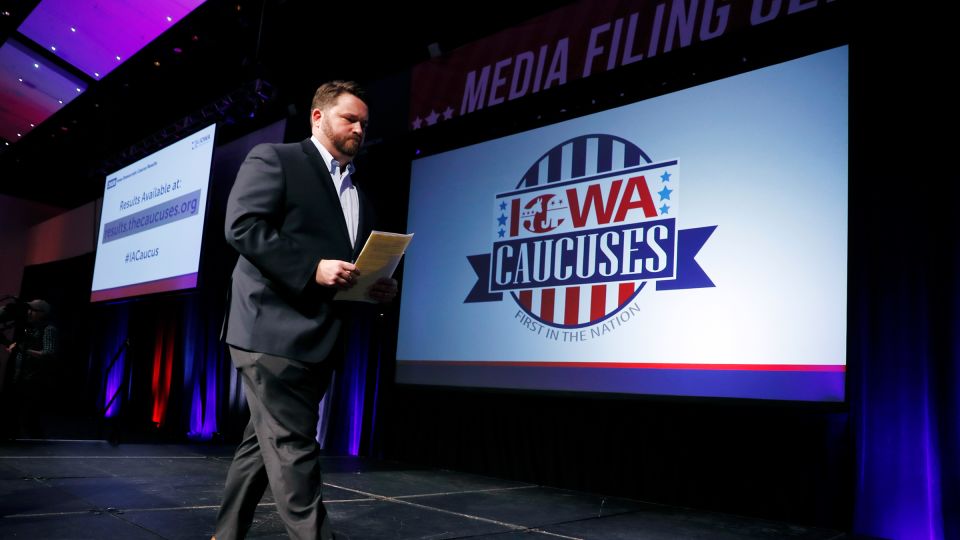Ahead of the 2024 presidential primaries, Iowa Democrats launched a Hail Mary to save their status as an early nominating state.
Chastened by the disastrous rollout of an app in 2020 that delayed the results of that year’s caucuses, the state party switched to a vote-by-mail primary and made its pitch alongside dozens of other states vying to go first. It also warned that moving Iowa out of first would give Republicans an opening to claim Democrats had abandoned the state.
It didn’t work. And two years after the Democratic National Committee made South Carolina the first primary state, overhauled the early nominating state window and demoted Iowa at the behest of former President Joe Biden, the future of Iowa’s Democratic caucuses looks bleaker than ever.
Iowa must now compete against dozens of other states when the party begins its deliberations on the 2028 calendar, a process that could begin as early as later this year.
The state party has lost its voice on the DNC’s powerful rules and bylaws committee that runs the process, while rival early states Nevada, New Hampshire and South Carolina gained a seat each, as did Michigan, which moved up the calendar in 2024.
The final makeup of the 2028 primary calendar will be critical to what strategies presidential campaigns employ and which candidates gain traction. Iowans are quick to note that their caucuses boosted the campaigns of former presidents Jimmy Carter and Barack Obama as well as former Transportation Secretary Pete Buttigieg. Republicans are expected to keep the start of their primary calendar in Iowa.
Critics of the caucuses, however, argue that the early states should reflect the diversity of the nation and overlap with the swing states Democrats need to win the general election. Even Democrats who support Iowa having an early say in the process are willing to let go of the caucus system, which critics say lacks the accessibility and flexibility of primary elections.
Under the traditional caucuses system, voters physically gather in places such as schools and churches the evening of the election and go through a series of votes, weeding out candidates who fail to gain enough support. The process can take hours.
“A generation of us have a lot of romanticism about the Iowa caucuses, and I do mourn that in some ways, but I think in the interest of fairness, making people stand for three hours in a gymnasium is just probably not the fairest way to do things,” said one Democratic strategist who has worked on several Iowa political campaigns.
DNC officials have insisted that the process to apply to be an early state will be open. Chairman Ken Martin said throughout his campaign to lead the committee that the calendar criteria should be to design a schedule that’s rigorous, efficient and would battle test candidates.
“The DNC is committed to running a fair, transparent, and rigorous process for the 2028 primary calendar. All states will have an opportunity to participate,” DNC communications director Abhi Rahman said in a statement. “Iowa’s DNC members and Chair Rita Hart are fierce advocates for Iowa Democrats and they will have their voices heard during that process.”
Hart, the Iowa Democratic Party chair, said her current focus is on winning elections in 2026, when her party will contest an open governor’s seat, a US Senate seat, and the state’s four congressional seats, at least two of which are competitive.
“I do expect to have tough and direct conversations with the DNC regarding our Iowa caucuses and the serious concerns surrounding the Biden 2024 calendar,” Hart said. “National Democrats let Trump get a head-start in the 2024 campaign by excluding Iowa.”
Pete Buttigieg speaks during a town hall hosted by VoteVets on May 13 in Cedar Rapids, Iowa. – Julia Hansen/Iowa City Press-Citizen/USA Today Network/Imagn Images
The uncertainty hasn’t stopped potential 2028 Democratic presidential candidates from adding Iowa to their early-state tours.
Buttigieg held a May town hall in Cedar Rapids, where he reminded the crowd of his narrow 2020 caucuses win five years earlier. Arizona Sen. Ruben Gallego will appear at the Iowa State Fair, long seen as a rite of passage for presidential hopefuls, in August. And former US Ambassador to Japan Rahm Emanuel, who is now a CNN commentator, will be the guest of honor at a party fish fry in September.
“People default to what they’ve done in the past,” said Molly Magarik, an outgoing DNC rules and bylaws committee member from Delaware who doesn’t support keeping Iowa first. “And so absent an alternative process, it doesn’t surprise me that people are still going to run the old playbook.”
Within Iowa Democratic circles, there has been some debate about how hard the state should fight to keep its early-state status or if Democrats there should just ignore the DNC altogether.
Pete D’Alessandro, a longtime Iowa Democratic strategist who worked on Bernie Sanders’ presidential campaigns and supports either caucuses or a primary, argued that Iowa Democrats should just set their date and ignore any potential consequences from the DNC, including a loss of delegates. Candidates, he said, would likely still show up, especially as the Republicans’ caucuses draw media attention.
“I’m gonna let you down a little secret, as someone who’s worked on these campaigns: They’re not coming here for the delegates,” he said.
For more CNN news and newsletters create an account at CNN.com

